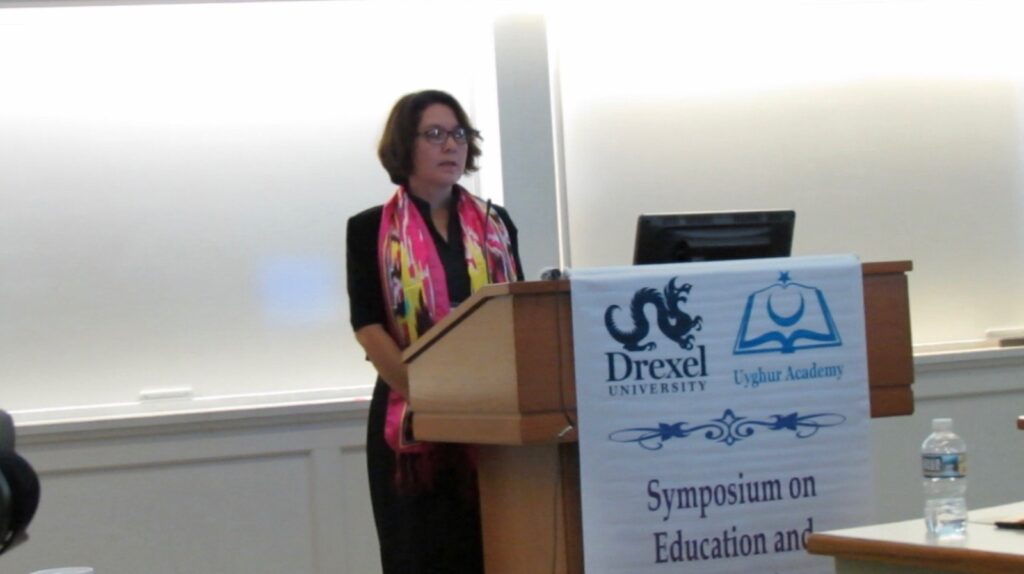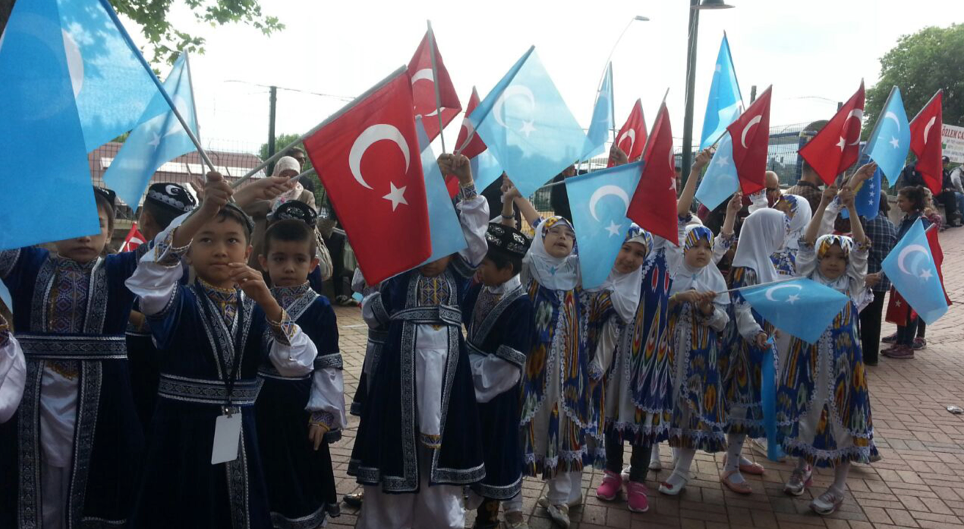Zubayra Shamseden Discusses Uyghur Language Transmission at Academic Conference

October 16, 2017
This month Zubayra Shamseden, UHRP’s Chinese Outreach Coordinator attended the 46th Annual Mid-Atlantic Region Association for Asian Studies Conference held at Drexel University to discuss the current situation of Uyghur children learning foreign languages overseas. Like other immigrant groups, Uyghur parents want their children to learn the language of the country where they migrated. However, any other foreign language learners, the Uyghur children also face some challenges.
Ms. Shamseden addressed the issue of Uyghur children learning new languages while overseas, pointing out that it can be challenging due to the lack of educational resources aimed at Uyghur speaking learners. Because 1) There is no continuous, supportive environment for the Uyghur language and Uyghur literary documentations to flourish in Uyghurs’ home country of East Turkestan due to Chinese government’s restrictive educational policies directed at Uyghurs. 2) Uyghur diaspora communities tend to be small and spread across the globe, it is challenging for Uyghur linguists or other language related professionals and experts to work continuously to protect the Uyghur language’s authenticity, development, and innovation to encourage bilingual Uyghurs to flourish. And 3) like other immigrants, Uyghur immigrant families sometimes face economic challenges that create additional difficulties in accessing educational resources.
Overseas Uyghur communities lack the financial and organizational capacity to manage and operate independent Uyghur language and culture education-oriented professional organizations, which would support Uyghur children in overseas to overcome foreign language learning challenges. Partly to meet these challenges Uyghur intellectuals have established the Turkey-based Uyghur Academy to help preserve and develop Uyghur language and culture.
Within East Turkestan, China’s the so-called bilingual education policy has made it difficult for Uyghur children to learn any foreign language other than Chinese. “As a translator, I translated for numerous Uyghur children in their asylum or other cases,” said Ms. Shamseden. “According to my conversations with many Uyghur children, the children expressed that ‘they wish that they have never learnt Chinese, because the foreign language has much commonality with the Uyghur in terms of using an alphabet, grammar and expression rather than Chinese’. However, due to their Chinese bilingual education class experiences in China, they don’t either have enough Uyghur or Chinese language proficiency, so they find it is very difficult for them to transmit their language ability to accommodate new language/third foreign language concepts.”
Students of a Uyghur language school in Turkey
In addition the cultural and identity expression that Chinese government imposes on Uyghurs limits their expression as either completely Uyghur or Chinese. Ms. Shamseden related the story of a Uyghur girl in the US who told her that she identified herself as Chinese from China when she first introduced herself in her ESL classroom. Once the English teacher organized a cultural night for the class, everyone was asked to dress in their own cultural/traditional clothes and bring a representative food; she came into class with absolute Uyghur look with a Uyghur food, which showed complete difference from a Han Chinese who identified herself as Chinese from China. “The real Han Chinese student was overjoyed about the situation, saying that ‘Uyghur, Han we are all one family in China’, but Uyghur girl felt upset at being included in this ‘family member of big Chinese’. So I asked her: ‘then why didn’t you identify yourself as Uyghur in the first place in the classroom?” She said, “I was afraid to say I am from “Xinjiang”/East Turkestan.”
Nevertheless, Uyghur children do well in grasping foreign languages, especially those using an alphabet like English and Russian. Uyghur children are eager to learn new things in an unrestricted learning environment. In order to ensure that this talent pool is able to reach its full potential Ms. Shamseden recommends investing in producing more materials for Uyghur children’s language acquisition such as dictionaries, bilingual story books (Uyghur stories translated into English), bilingual multimedia, and online tools and establishing a systematic, formal education institutions to help Uyghur children to grow up bilingually in foreign countries.

